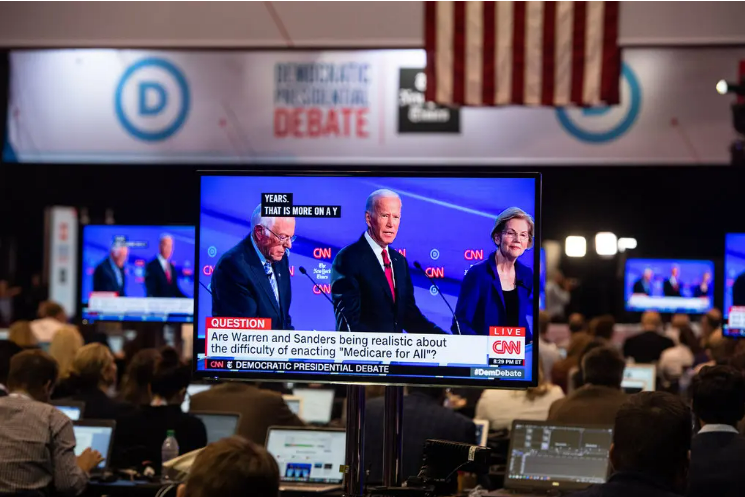这篇由Edward Xu撰写的文章是我们第七届年度学生编辑大赛高中组的前9名获奖者之一,我们收到了6,076份参赛作品。

。。。希拉里·斯威夫特为《纽约时报》撰稿
“How Pragmatism Is Poisoning the Democratic Will of America’s Youth”
By Edward Xu, age 16, Shanghai American School, Puxi Campus, Shanghai, China
What the 2020 election cycle has taught me is that the most hopeless candidate is whichever one excites me. Throughout the year, I progressed from falling in love with Andrew Yang’s human-centered capitalism, to begrudgingly rallying behind Elizabeth Warren’s battle with billionaires, and finally being forced to support Bernie Sanders as the only remaining candidate whose conception of human rights aligned with mine.
And now, like so many other teenagers, I am deeply disappointed — or at least vaguely resentful — with the nomination of Joe Biden. Love or hate Biden, it is impossible not to mourn the unfortunate defeat of some of the most novel policy proposals in American history by the textbook definition of establishment. While the passionate communities of “Yang Gangers” and “Bernie or Bust” voters were able to keep their candidates on a lifeline, the unoffensive and palatable nature of Biden invoked a much more powerful force opposing the optimism of radical reformists: Pragmatism.
Increasingly, members of the Democratic Party have surrendered their ideology for the singular goal of unseating President Trump in 2020. A report from The New York Times showed that after the first six Democratic primary debates, “party strategy” received more airtime than climate change — and almost as much time as women’s rights and education combined. This sacrifice exists far beyond screen coverage, as a YouGov survey of Democratic primary voters found that 65 percent of respondents believed that a candidate’s electability was more important than their stances on major issues.
When did we learn to consider democracy as a means to an end? When did politics become about idle stewardship and keeping someone else out of office? When were the human aspirations of change swallowed by our fear of failure?
While administrations come and pass, the soul of a generation persists for decades. As my peers and I evolve from teenagers to activists, any inaction will be seen as a free pass for complacency. If we refuse to abstain out of principle, our threats have no leverage. If we refuse to stray from the party line, our demands receive no reaction. If we refuse to dream bigger, our successes will always be mild.
Two things need to happen to restore courage and imagination to America’s political youth. First, reform in the voting system itself. America needs to abandon “first past the post” and transition to sensible alternatives, such as the single transferable vote, which dispel considerations of popularity while voting. Second, Gen Z-ers need to recognize the collective power they hold over the fate of our country. With a voting bloc 72 million strong, there is no need to hide behind the party sanctioned poster boy.
One day it will finally register, that the future is ours to decide.
Works Cited
Barbaro, Michael. “Who’s Actually Electable in 2020?” The New York Times, 5 Nov. 2019.
Burden, Barry. “Democrats Aren’t Voting Only on ‘Electability.’ They’re Just as Interested in Candidates’ Stances on the Issues.” The Washington Post, 4 March 2020.
Seitz-Wald, Alex. “‘Electability’ Is the Most Important, Least Understood Word in the 2020 Race.” NBCNews.com, 23 June 2019.
The New York Times. “The Issues That Got the Most Time at the Debates So Far.” The New York Times, 20 Nov. 2019.